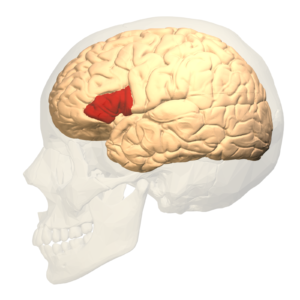
Broca’s area. Image credit:Â By Polygon data were generated by Database Center for Life Science(DBCLS)[2]. – Polygon data are from BodyParts3D[1], CC BY-SA 2.1 jp, https://commons.wikimedia.org/w/index.php?curid=32508617
I’ve been speechless in the wake of the shooting at Pulse in Orlando. My personal Facebook page has been dominated by the words of others and very little in my own words. I feel horror, terror, sadness, overwhelm… and I can’t put it into words. It’s the same when I try to describe how I grew up; words fail me.
Many trauma victims simply can’t really talk about what happened. We all develop a “cover story” – a way of telling others what happened, but that story doesn’t even come close to explaining the experience. I can tell others that my mother sexually, physically, and emotionally abused me; my sister physically and emotionally abused me; and my father emotionally abused me. Sometimes I can share a story I remember. But I don’t have the words to clearly communicate what happened; and I enjoy writing, love language, and would say that I’m usually an effective communicator. It’s really frustrating that I don’t have the ability to use my skills to communicate what happened.
Turns out there’s a physiological reason for this. In a study described in Bessel Van Der Kolk’s ‘The Body Keeps the Score‘ (affiliate link), people recounting traumatic experiences while in an fMRI machine showed several brain changes. One of these was decreased activity in Broca’s area (see image above), which is responsible for speech. (Injuries to this area are common in stroke victims.) One of the participants in the study had lost her daughter and a pregnancy in a car accident 13 years earlier and still had significant decreases in Broca’s area as she described the incident during the fMRI.
Broca’s area is in the left hemisphere of the brain. During the fMRIs, the left hemisphere of the brain was deactivated when the participants were describing their trauma; when they described a control scenario where they felt safe and calm, their left hemisphere was very active. During traumatic flashbacks, only the right hemisphere of the brain was very active – flashbacks can be said to be a right brain event. And that presents some serious trouble: the right hemisphere has very poor time sense which means that the flashback can be experienced as if it were happening right now. It also means that flashbacks are intense emotional experiences since the right hemisphere stores memories of emotions, sounds, sights, touches and smells. For someone who isn’t aware of their triggers, a flashback is not only overwhelming, it is confusing as they don’t understand why they are so upset.
It can also mean that when someone has to recount their trauma (for the police, to get therapeutic help, etc), they may struggle to contain the emotional storm while experiencing the frustration of struggling for words. That changes their emotional affect. Some folks become very emotionally subdued and appear not to care. Others, like me, resort to macabre humor to defuse the painful emotions. Folks who don’t understand trauma may interpret these emotional presentations as evidence that the person telling their story wasn’t really traumatized. I’ve been told that what happened to me “must not have been that bad,” because I was making jokes so I wouldn’t start crying.
This adds another layer of emotional labor to an intense and frustrating experience. Somehow, we are supposed to figure out how to present enough emotion to be convincing, but not so much that we become overwhelmed and are unable to continue. Or, worse, we have to be careful to gauge our audience so we don’t end up needing to take care of them when they have an emotional reaction to our story. I’ve definitely failed at managing these conflicting needs. All of this with a decreased ability to communicate!
Knowing that Broca’s area becomes deactivated helps me be more compassionate to myself when I struggle to talk about my experiences. It helps me be patient with others who are not able to talk about what happened to them. Can you use this knowledge to become more compassionate to yourself? Let’s chat about it at www.facebook.com/QuietStormsCO
More soon,
dawn

You must be logged in to post a comment.